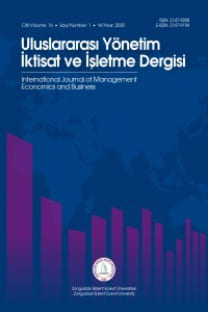EMTİA FİYATLARI BİRBİRLERİNİ ETKİLER Mİ? ASİMETRİK FREKANS NEDENSELLİK ANALİZİ
Son yıllarda yaşanan krizler geleneksel yatırım araçlarının sorgulanmasına yol açmıştır. Bu durum ise yatırımcıların portföy oluşturma sürecinde emtialara eskiye oranla daha fazla yönelmelerine neden olmuştur. Bununla birlikte emtia fiyatlarında özellikle arz ve talebe bağlı olarak yaşanan dalgalanmalar ise alternatif emtialar arasındaki ilişkilerin karmaşıklaşmasına yol açmaktadır. Bu bağlamda çalışmada 16.09.2008-12.08.2017 tarihleri arasında petrol, altın ve gümüş fiyatlarına ait veriler, asimetrik frekans nedensellik analizi ile araştırılmıştır. Çalışma sonucunda söz konusu emtialar arasında kısa, orta ve uzun dönemde asimetrik nedensellik ilişkileri tespit edilmiştir.
Anahtar Kelimeler:
Emtia Fiyatları, Asimetrik Frekans Nedensellik Analizi, Portföy Yönetimi
COMMODITY PRICES AFFECT EACH OTHER? ASYMMETRIC FREQUENCY CAUSALITY ANALYSIS
The crises experienced in recent years have caused the traditional investment instruments to be questioned. This has led investors to focus more on commodities in portfolio construction process compared to the past. However, fluctuations in commodity prices, especially due to supply and demand, lead to the complication of the relations between alternative commodities. In this context, data of oil, gold and silver prices between 16.09.200812.08.2017 were investigated by asymmetric frequency causality analysis. As a result of this study, short, medium and long term asymmetric causality relations between the commodities were determined
___
- Bahmani-Oskooee, M., Chang, T., & Ranjbar, O. (2016). Asymmetric causality using frequency domain and time- frequency https://doi.org/10.1016/j.econmod.2016.03.002 (wavelet) approaches. Economic Modelling, 56, 66 – 78.
- Breitung, J., & Candelon, B. (2006). Testing for short and long-run causality: A frequency-domain approach. Journal of Econometrics, 132(2), 363 – 378. https://doi.org/10.1016/j.jeconom.2005.02.004
- Chang, T., Ranjbar, O., & Jooste, C. (2017). Stock Market Interactions between the BRICS and the United States: Evidence from Asymmetric Granger Causality Tests in the Frequency Domain. Iranian Economic Review, 21(2), 297 – 320. https://doi.org/10.22059/IER.2017.62105
- Ciner, C. (2011). Information transmission across currency futures markets: Evidence from frequency domain tests. https://doi.org/10.1016/j.irfa.2011.02.010 Review of Financial Analysis, 20(3), 134 – 139.
- Ciner, C., Gurdgiev, C., & Lucey, B. M. (2013). Hedges and safe havens: An examination of stocks, bonds, gold, oil and exchange rates. International Review of Financial Analysis, 29, 202 – 211. https://doi.org/10.1016/j.irfa.2012.12.001.
- Dickey, D. A., & Fuller, W. A. (1981). Likelihood ratio statistics for autoregressive time series with a unit root. Econometrica, 49 (4), 1057 – 1072. https://doi.org/10.2307/1912517
- Doornik, J. A., & Hansen. H. (2008). An omnibus test for univariate and multivariate normality. Oxford Bulletin of Economics and Statistics, 70: 927 – 939. https://doi.org/10.1111/j.1468-0084.2008.00537.x
- Geweke, J. (1982). Measurement of linear dependence and feedback between multiple time series. Journal of the American Statistical Association, 77, 304 – 324. https://doi.org/10.1080/01621459.1982.10477803
- Granger, C. W. J., & Yoon, G. (2002). Hidden Cointegration. Department of Economics Discussion Paper 2002- 02, University of California, San Diego. https://doi.org/10.2139/ssrn.313831
- Hacker, R. S., & Hatemi-J, A. (2005). A test for multivariate ARCH effects. Applied Economics Letters 12 (7), 411 – 417. https://doi.org/10.1080/13504850500092129
- Harri, A., Nalley, L., & Hudson, D. (2009). The Relationship between Oil, Exchange Rates, and Commodity Prices. https://doi.org/10.1017/S1074070800002959. Agricultural and Applied Economics, 41(2), 501 – 510.
- Hatemi-J, A. (2012). Asymmetric Causality Tests with an Application. Empirical Economics, 43 (1), 447 – 456. https://doi.org/10.1007/s00181-011-0484-x
- Hosoya, Y. (1991). The decomposition and measurement of the interdependence between second-order stationary processes. Probability Theory and Related Fields, 88(4), 429 – 444. https://doi.org/10.1007/BF01192551
- Lucey, B. M., & Tully, E. (2006). The evolving relationship between gold and silver 1978–2002: evidence from a dynamic cointegration analysis: a note. Applied Financial Economics Letters, 2(1), 47 – 53. http://dx.doi.org/10.1080/17446540500426789
- Ma, Z., Xu, R., & Dong, X. (2015). World oil prices and agricultural commodity prices: The evidence from China. Agricultural Economics, 61, 564 – 576. https://doi.org/10.17221/6/2015-AGRICECON
- Phillips, P. C. B., & Perron, P. (1988). Testing for a unit root in time series regression. Biometrika 75 (2), 335 – 346. https://doi.org/10.1093/biomet/75.2.335
- Ranjbar, O., Chang, T., Nel, E., & Gupta, R. (2017). Energy consumption and economic growth nexus in South Africa: Asymmetric frequency domain approach. Energy Sources, Part B: Economics, Planning, and Policy, 12(1), 24 – 31. https://doi.org/10.1080/15567249.2015.1020120
- Reboredo, J. C. (2013). Is gold a hedge or safe haven against oil price movements?. Resources Policy, 38(2), 130 – 137. https://doi.org/10.1016/j.resourpol.2013.02.003.
- Sari, R., Hammoudeh, S., & Soytas, U. (2010). Dynamics of oil price, precious metal prices, and exchange rate. Energy Economics, 32(2), 351 – 362. https://doi.org/10.1016/j.eneco.2009.08.010
- Soytas, U., Sari, R., Hammoudeh, S., & Hacihasanoglu, E. (2009). World oil prices, precious metal prices and macroeconomy https://doi.org/10.1016/j.enpol.2009.08.020 Turkey. Energy Policy, 37(12), 5557 – 5566.
- Wang, Y. S., & Chueh, Y. L. (2013). Dynamic transmission effects between the interest rate, the US dollar, and gold https://doi.org/10.1016/j.econmod.2012.09.052 oil prices. Economic Modelling, 30, 792 – 798.
- Yılancı, V., & Bozoklu, S. (2014). Türk Sermaye Piyasasında Fiyat ve İşlem Hacmi İlişkisi: Zamanla Değişen Asimetrik http://www.onlinedergi.com/makaledosyalari/51/pdf2014_2_5.pdf Analizi. Ege Academic Review, 14(2), 211 – 220.
- Zhang, Y., & Wei, Y. (2010). The crude oil market and the gold market: Evidence for cointegration, causality and price discovery. Resources Policy, 35(3), 2010, 168 – 177. https://doi.org/10.1016/j.resourpol.2010.05.003
- Ek-1: Asimetrik Frekans Nedensellik Sonuçları
- ISSN: 2147-9208
- Başlangıç: 2005
- Yayıncı: Zonguldak Bülent Ecevit Üniversitesi
Sayıdaki Diğer Makaleler
Erdem CAM, Murat ATAN, Elif ÇELİK, Berna Yazar ASLAN, Deniz BOZ ERAVCI
İSTANBUL’DAKİ KÜÇÜK VE ORTA ÖLÇEKLİ OTEL İŞLETMELERİNDE İŞGÖREN SEÇİMİ
Sevinç ASLAN, Mithat Zeki DİNÇER
Himmet KARADAL, Fahri ÖZSUNGUR
Abdulbaki BARAN, Cevat SÖYLEMEZ, Müberra YURDAKUL
EMTİA FİYATLARI BİRBİRLERİNİ ETKİLER Mİ? ASİMETRİK FREKANS NEDENSELLİK ANALİZİ
Melik KAMIŞLI, Serap KAMIŞLI, Fatih TEMİZEL
ÖRGÜTLERDE İŞ ROLÜ ALGILARI, SİNİZM VE ALGILANAN PERFORMANS ARASINDAKİ İLİŞKİ
GÖÇMEN GİRİŞİMCİLİĞİNİN AB DÜZEYİNDE TEŞVİK EDİLİŞİNİN DOĞUMU VE KAPSAMI
TÜRKİYE EKONOMİSİNDE ENFLASYON VE EKONOMİK BÜYÜME 1950-2015
